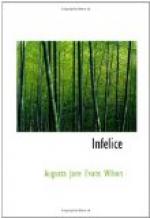We are instructed that our instincts and consciousness dwell in the “sensory ganglia,” that “an idea is a contradiction, a motion, a configuration of the intermediate organ of sense,” that “memory is the organic registration of their effects of impressions,” and that the “cerebrum” is the seat of ideas, the home of thought and reason. But when “grey-matter” that composes this thinking mechanism becomes diseased, and the cold touch of death stills the action of fibre and vesicle, what light can our teachers pour upon the future of that coagulated substance where once reigned hope, ambition, love, or hate? Those grey granules that were memory, become oblivion. Certainly physiology has grown to giant stature since the days of St. Paul, but does it bring to weeping mourners any more comfort than the doctrine he taught the Corinthians?
Does the steel Law Mill of Progressive Development grind us either tonic or balm for the fatal hours of sorest human trial? We have learned that “the heart of man is constructed upon the recognized rules of hydraulics, and with its great tubes is furnished with common mechanical contrivances, valves.”
But when the valvular action is at rest under the stern finger of death, can all the marvellous appliances of this intensely and wonderfully mechanical age force one ruddy drop through those great tubes, or coax one solitary throb, where God has said “Be still”?
To the stricken mother, bowed over the waxen image of her darling, is there any system, theory, or creed that promises aught of the Great Beyond comparable to the Christian’s sublime hope that the pet lamb is safely and tenderly folded by the Shepherd Jesus?
To the aching heart and lonely soul of sorrowing Regina these vexing riddles that sit open-mouthed at our religious and scientific cross-roads, brought no additional gloom; for with the pure holy faith of unquestioning childhood she seemed to see beside the rigid form of her pastor and friend the angel who on sea-girt Patmos bade St. John write, “Blessed are the dead who die in the Lord, from henceforth; yea, saith the Spirit, that they may rest from their labours; and their works do follow them.”
Anxious to avoid those who sat within keeping sad watch, the unhappy girl went around to the front entrance, and sank down on the lowest step, burying her face in her hands.
The library was merely a continuation of the hall that ran east and west through the centre of the house, and though comparatively remote from the front door was immediately opposite, and from the sight of that room Regina shrank instinctively.
Too much shocked and stunned to weep, she became so absorbed by thoughts of to-morrow’s mournful mission, that she failed to notice the roll of wheels along the street, or the quick rattle of the gate-latch. The sound of rapid footsteps and the rustle of drapery on the pebbled walk, finally arrested her attention, and rising she would have moved aside, but a hand seized her arm.




